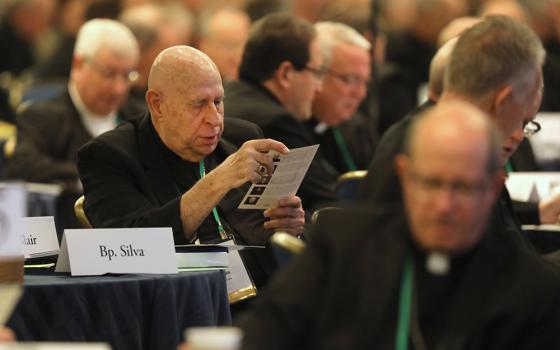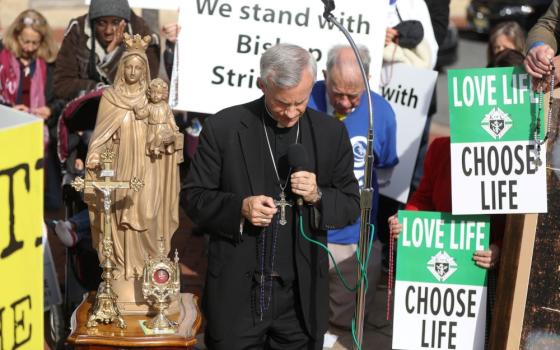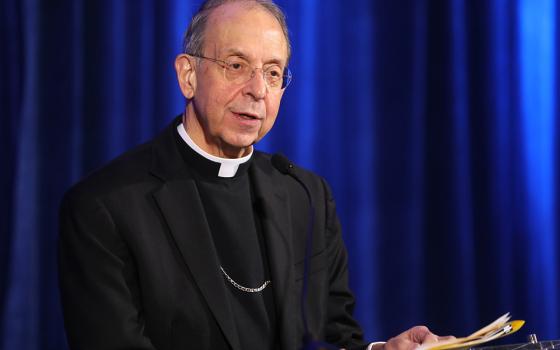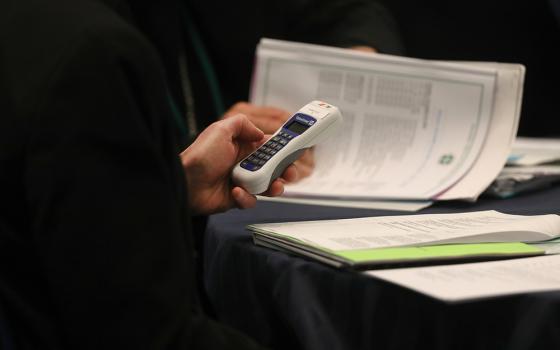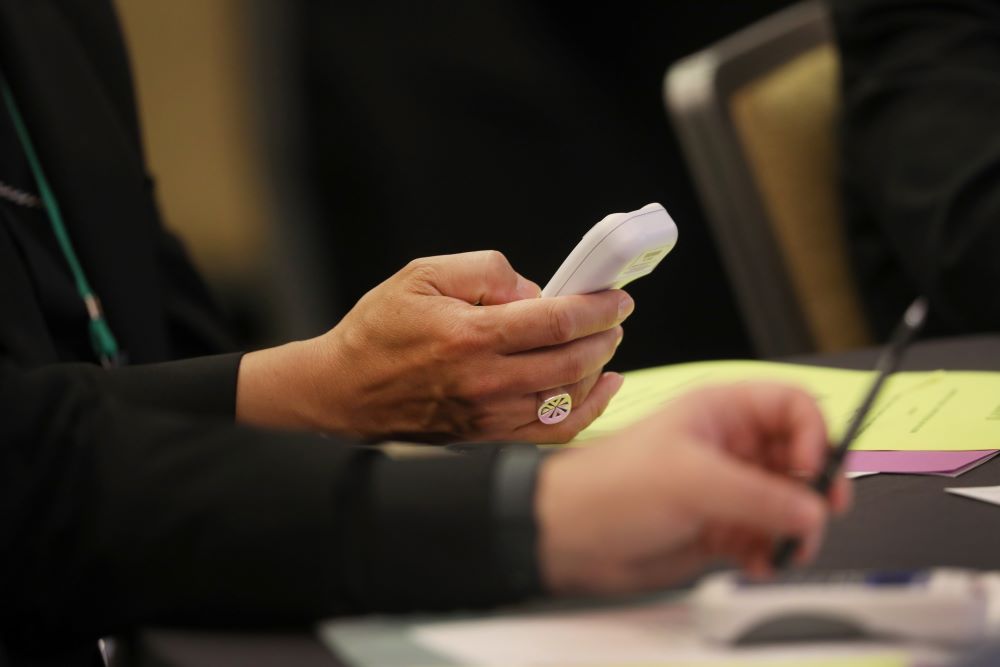
A prelate prepares to vote June 16, 2023, during the U.S. Conference of Catholic Bishops' spring plenary assembly in Orlando, Fla. When the U.S. bishops gather Nov. 13-16 in Baltimore for their fall plenary assembly, they will elect a new secretary and chairmen for six standing USCCB committees. (OSV News/Bob Roller)
The U.S. Conference of Catholic Bishops has announced the slate of candidates for a new secretary of the conference and several committee chairs. The choices the bishops make when they gather Nov. 13-16 in Baltimore for their fall plenary assembly will be a good indication of the direction in which the body of bishops wish to go.
The most important choice will be that of a new secretary for the conference. Not only will the bishop selected be a member of the executive committee, which is called upon to make a variety of administrative decisions, he will also serve as chairman of the USCCB's Committee on Priorities and Plans. In that role, among other things, the chair draws up the slate of nominees for these elections, so it is a very influential position. The two nominees are the current secretary, Archbishop Paul Coakley of Oklahoma City, and Archbishop Alexander Sample of Portland, Oregon.
Coakley was elected as interim secretary last November, defeating Cardinal Joseph Tobin of Newark by a 130-104 vote. It was last year's most telling election, a head-on choice between someone closely aligned with Pope Francis and someone who isn't.
Archbishop Paul Coakley of Oklahoma City (OSV News/Bob Roller)
The fact that Coakley is handsome and gregarious shouldn't obscure his ideological leanings. After the disgraced former nuncio Archbishop Carlo Maria Viganò issued his call for Pope Francis to resign in a "testimony" filled with lies and innuendos in 2018, Coakley issued a statement that read, in part: "While I lack any personal knowledge or experience of the details contained in his 'testimony,' I have the deepest respect for Archbishop Viganó and his personal integrity." He could not muster a word of respect for Pope Francis.
Coakley is also the "ecclesiastical advisor" to the Napa Institute, the organization that gathers right-wing Catholic plutocrats for annual meetings at founder Tim Busch's Napa Valley resort for talks, fancy dinner and cigar receptions. I will take odds on his being the anti-Francis caucus' nominee for president of the conference in two years' time.
Archbishop Alexander Sample of Portland, Oregon (CNS/Bob Roller)
Archbishop Sample is not exactly a pro-Francis alternative, nor does he seem to be an effective leader. Earlier this year, he shuttered the archdiocesan Department for Catholic Schools, apparently due to controversy surrounding his mandates concerning students who identify as transgender. I share the concerns of those who think the transgender agenda has been embraced a little too feverishly, but any administrator who ends up having to disband a major part of his bureaucracy because he couldn't bring them along raises questions about his own competence and leadership.
Sample has also voiced support for San Francisco Archbishop Salvatore Cordileone's decision to refuse communion to Rep. Nancy Pelosi because of her support for abortion. I think Pelosi is wrong on abortion, but the failure to distinguish between voting on a public policy issue and the act of procuring an abortion is lousy theology. He not only is fond of celebrating the Tridentine rite, he also said in a 2017 interview that all priests should be taught how to celebrate it. Not exactly the most forward-looking understanding of formation.
Both alternatives are bad, but the bishops are likely to choose Coakley.
The contest for chair of the Committee on Education is easy. Bishop David O'Connell of Trenton was the president of the Catholic University of America before becoming a bishop, in fact, he was the best president of CUA in my lifetime, and he played a critical role in the implementation of Ex corde ecclesiae, the 1990 apostolic constitution on higher education, which brought particular focus to the role of Catholic identity in our colleges and universities. O'Connell is the logical choice over Bishop James Conley of Lincoln, Nebraska.
The nominees for the chair of the Communications Committee are Bishop Bill Byrne of Springfield, Massachusetts, and Archbishop Christopher Coyne, the new coadjutor of Hartford. Again, this is an easy choice. When he previously served as chair of this committee, Coyne earned the respect of bishops, staff and journalists, a rare accomplishment. At his installation Oct, 9, he began his homily with a self-deprecating joke about a pompous bishop. What's not to love? Coyne is articulate, engaged and very smart. Although Byrne is, like me, a dog lover, he does not have Coyne's communications chops and this, too, should be an easy choice.
The Committee on Cultural Diversity poses an interesting choice. Bishop Robert Brennan of Brooklyn leads one of the most diverse dioceses in the country. I hear good things about him from Brooklyn. Bishop Earl Fernandes of Columbus is the son of immigrants but has far less experience in Ohio with the vast diversity of the American church's membership. Fernandes is smart, and he had a thoughtful intervention at the meeting of bishops, theologians and other church leaders held at Boston College in March. Still, the bishops should choose Brennan.
Advertisement
I do not know either of the nominees to lead the Committee on Doctrine. Bishop James Massa is an auxiliary bishop of Brooklyn and rector of the seminary at Dunwoodie. He wrote his doctoral dissertation in systematic theology under the late Cardinal Avery Dulles. Bishop John Doerfler of Marquette did his doctoral work at the John Paul II Institute for Marriage and the Family, so his theological training is more circumscribed. In 2016, he issued a pastoral letter on sacred music, and I thought — great! Improving the quality of music at our Masses is one of the things people in the pews cite as important. Alas, the document set the requirement that everyone learn the English and Latin chants for the Mass parts. I know my Latin chants, thank you very much, but requiring it of everyone seems like a stretch.
For the chair of the National Collections office, the nominees are Bishop Shawn McKnight of Jefferson City, Missouri, and Bishop Daniel Mueggenborg of Reno, Nevada. Bishop McKnight is very bright, and often makes intelligent and bridge-building interventions at the USCCB meeting. I do not know Bishop Mueggenborg, but hear good things about him also. Either candidate would be fine but the bishops should find out beforehand if Mueggenborg has a plan for getting some money from his see city's casinos!
The final contest is that for chair of the Pro-Life Activities Committee and the nominees are San Francisco Archbishop Salvatore Cordileone and Bishop Daniel Thomas of Toledo. I do not know Bishop Thomas but one could say of Cordileone what Winston Churchill said of John Foster Dulles: He is the only bull I know who carries his own china shop with him. The bishops should choose Thomas.
Very few of the nominated candidates shout "Pope Francis." Indeed, few even whisper it. But committee chairs are very powerful. When they undertake a major project or document, the body of bishops is always very reluctant to reject that work. The list shows a divided conference, and that will only change slowly and if the bishops themselves make it a priority. I wouldn't hold my breath.





